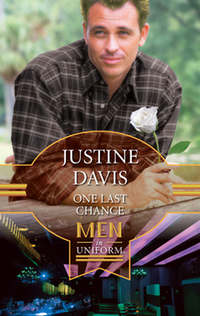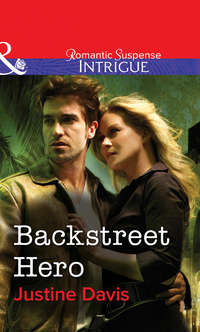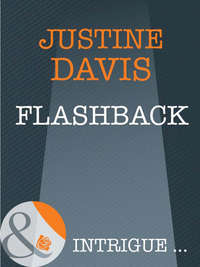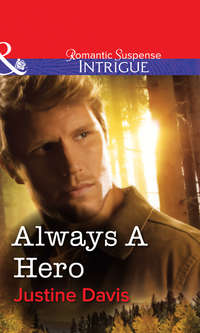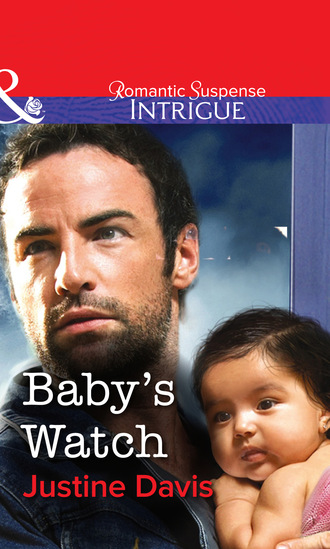
Полная версия
Baby's Watch
Back in his small but clean and tidy room, Ryder took a quick shower, wrapped a towel around his waist and sat on the edge of the bed. He reached into the nightstand drawer and took out his pay-as-you-go cell phone. He had the other one, the one they’d given him to use, the one they paid the bill on. But there were some things Ryder preferred to keep private, and his talks with Boots definitely fell into that category, for both their sakes. The convict had gruffly made him promise to stay in touch, which, according to him, meant to take the weekly call Boots made.
That was a lot more staying in touch than Ryder was used to, but he hadn’t been able to say no to the older man. Not after everything he’d done. So for the past seven months, when the phone rang on Wednesday mornings, he answered it.
Right on cue, the cell rang.
“How goes it, boy?”
“Not backward,” Ryder said dryly.
Boots chuckled, that raspy, wry sound Ryder always associated with the older man. He could picture him, on the phone in the dayroom, lean, wiry and leathery. After fifteen years in prison, his ability to laugh at all was a marvel. Ryder thought his own three years had leached all humor out of him, and left him with only that new appreciation of irony.
“Sometimes,” Boots said, “that’s the best you can hope for.”
“It’s not enough.”
“Depends on who’s doing the grading. You always did want more faster.”
Boots didn’t point out that that very trait had been what had landed Ryder in trouble so many times—okay, most times—in his life. Perhaps he assumed it was obvious, even to Ryder, that he didn’t have to.
Perhaps it was that obvious. Ryder jammed a hand through his thick, dark, and still shower-damp hair.
“So no progress?”
“I’m running out of cigars,” Ryder said. “Is that progress?”
“Of a sort,” Boots said with another chuckle.
Ryder had to consider his words carefully. After all, he wasn’t supposed to be discussing his new “job” with anyone. But since Boots already knew about it—he’d been with Ryder when the men in the dark suits and the government-issue sunglasses had shown up in the first place—Ryder didn’t figure he was giving away any state secrets talking to him, as long as he was careful.
“It’s strange. To be out there, but…not to be. To have to hide.”
He’d managed to let Boots know how the trail he’d been following had led him to, of all places, his brother’s Bar None ranch.
“You don’t think he’s involved, do you?”
At the very thought of straight-arrow Clay being involved in anything illicit, Ryder had to smother a laugh. “No way in hell,” he said succinctly. “I’m the problem child in that family.”
“Were,” Boots said gently.
“You’d be hard-pressed to convince my brother of that, I’m guessing.”
“I won’t have to,” Boots said. “You will. Once you’re free of all this.”
This was old ground; Boots was determined that Ryder would reunite with his family, once this was all over. Ryder had tried to tell him Clay had washed his hands of him, and once Clay made up his mind, it took heaven and earth to change it. While Ryder believed in earth—at least the six feet of it he expected to be under before he was forty—heaven? No.
Somewhat to his surprise, Boots, a deeply religious man now, didn’t push it on him. He believed enough for both of them.
“I’ve got to get some sleep, if I’m going to go out and play spy again tonight.”
“You’re not playing,” Boots reminded him. “If this is for real, it could be dangerous.”
Ryder couldn’t quite imagine baby smugglers as armed and threatening.
As if he’d read his thoughts—Boots was good at that, even over the phone—the man chided him gently. “You’re not taking this seriously enough, Ryder. Don’t let the nature of the contraband fool you. There’s a lot of money at stake in this venture. Probably more per ounce than any you’ll ever come across.”
He’d never thought of it that way. He really had no idea how much it cost to buy a kid, and he hadn’t asked. Maybe he should. Because Boots was right; where there was money, there were men who would fight to get it and keep it.
“Something’s coming,” Boots said. “You watch your back.”
“You been talking to the Boss again?” Ryder teased; Boots spoke to God as if he were a poker buddy sometimes, making what he called “suggestions,” most of which of late seemed to involve the salvation of one Ryder Colton. And no matter how much Ryder tried to talk the old man out of it, Boots never gave up on him.
More than I can say for my brother, he thought as Boots ignored the jibe.
“More the other way around. Just a feeling, Ryder. Be watchful.”
With that Boots’s phone time was up, and the call ended.
That was what drove him craziest about Boots and his beliefs, Ryder thought; no matter what happened later, the man would nod wisely and say, “I told you.” If what happened was something good, it was straight from his God. If it was something bad, God’s intervention had lessened the blow.
Yet, Ryder thought as he pulled the thankfully room-darkening curtains of the small motel room closed, he couldn’t deny that the man’s pure, shining faith had had an effect on him. He’d fought it, resisted fiercely, but Boots’s quiet determination to save him from himself had made inroads.
He’d finally decided that the principles underlying Boots’s beliefs were good no matter what the foundation. And when Boots had laughed and told him he didn’t have to believe to live by them, the result was the same—Ryder had felt a sudden sense of relief he’d never known before. And in that moment he’d determined to give it a shot, for the sake of the man who had seen something in him worth saving, a man who would never see the outside again, but still found hope.
To his surprise he slept well, for nearly seven hours. More than enough to keep going. He got up, dressed, grabbed his last box of Little Travis cigars and headed out. He wasn’t hungry yet; Mrs. Sanchez’s hearty breakfast was still holding. So he headed instead to the local library branch.
It wasn’t as foreign territory to him as he supposed many might think, given his capacity for trouble. There had been times when he’d wanted information, and had wanted to get it without his big brother hanging over his shoulder. Esperanza’s tiny library was just that, tiny, and his presence would be noticed—and reported on to Clay within hours—so he’d avoided that. But there were other towns, other libraries, and he spread it around.
His official cell phone rang as he pulled into the parking lot of the library.
“You didn’t check in,” a stern voice said.
“I did,” Ryder countered. “I left a message. Not my fault you didn’t answer. I needed sleep.”
His alternate handler—an agent named Gibson—apparently decided to let it go. “Developments?”
I’m about out of cigars and my ass is tired of sitting all night in the dark, waiting for nothing, he thought. But he knew better than to bitch, at this guy in particular. He was a little more human, and sometimes even unbent enough to commiserate with the frustration Ryder felt. Ryder didn’t want to blow that.
“Nothing. No movement, no sign of movement, and nobody who shouldn’t be around. They go lights out around here early, and it stays that way.”
Work started very early on a ranch, and Clay Colton was serious about work. Ryder had chosen to ignore his brother’s work ethic and this had always been the biggest bone of contention between the two brothers.
That, and the fact that Ryder had been born for trouble.
“The biggest thing that’s happened around here is people keep getting married,” Ryder said. “The sheriff, his brother…”
Ryder clammed up before he let slip something that gave him away. It wouldn’t do to mention that he knew his ex-sister-in-law was back on the ranch, or the even bigger shock of learning that his little sister had married some overtense suit.
As far as his handlers knew, he had no family. None of them really wanted to claim him, so he’d done the same. On anything that had required listing next of kin, he’d put “None.” And that’s how it would stay. For all he knew, that’s why they’d picked him for this job. Maybe Boots was right, and this was more potentially dangerous than he’d realized.
Not that it mattered. He could get blown away tomorrow, and it would barely cause a ripple. Boots might shake his head sadly, but that was the truth. No one else would really care. Not that he expected them to; there was something inherently wrong with him. If even his own father and brother wanted nothing to do with him, why would anyone else?
“We need to get this wrapped up,” Gibson said. “The Colton campaign is on its way to San Antonio soon, and we do not want to try and run this operation with all that going on.”
The casual reference gave Ryder a jolt. He’d been so focused on his little bit of work here, the bigger happenings in the world hadn’t even registered. Not that he ever paid much attention to politics, not even presidential politics.
He wondered what that cool, commanding voice on the other end of the phone would think if he realized that he was speaking to a man who was, technically if not officially, the nephew of the man who could well become president of the United States.
Wasn’t there some branch of the feds who investigated all the family members of people who aspired to the highest office? It only made sense. And the fact that Joe Colton’s ne’er-do-well brother had fathered a crop of kids outside his marriage wasn’t exactly a secret.
For the first time, it hit Ryder that he was, by blood, connected to a very famous family. Not that they would claim him any more than his own father had, but still, if he were mercenary enough…
He could almost see Boots’s frown. Could hear the old man’s stern warning that that way lay hellfire. Could even hear himself answering, “Don’t worry, Boots. That’d mean I’d have to claim Graham Colton as my father, and that ain’t ever going to happen.”
That much was the truth. No amount of money or famous family would make him do that. He might feel a bit of wistful sadness about losing his brother and sister—they’d once been a tight-knit group—but his father meant less than nothing to him.
As he meant less than nothing to his father.
“Don’t forget to check in when you’re in place tonight.”
“Yeah,” Ryder said absently, locking the truck as he headed for the library. He could have asked how much money they were talking about here, but caution won out; he didn’t want them thinking he was pondering going over to the other side.
He didn’t think his recruiters had believed him when he’d told them, just as he had told the court at his trial, that he’d never intended to smuggle illegals into the country. That he’d merely been paid to drive a truck, that as far as he knew was full of computer equipment. No one had believed him back then.
In fact, it had barely bothered him that he’d ended up in prison for something he hadn’t intended to do. As he’d told Boots later, when the man had begun to talk to him about his future, he’d done enough intentionally to land him here anyway.
“It’s just karma catching up with me,” he’d said. “No big deal.”
“But a big chance,” Boots had said, already launching into his crusade to salvage Ryder’s life.
Ryder hadn’t been listening to the older man, though. Not then. This situation wasn’t going to change anything, not really. To his way of thinking, it was just a speed bump on his racetrack, and he’d be back at full tilt as soon as he got out. Older and wiser, maybe. Hopefully wise enough to keep from getting caught next time trouble irresistibly called his name.
Once he’d spent a couple of hours in the library researching, he was a little stunned at what he’d found. At how much people would pay for a child they knew nothing about. At how long this had been going on, seemingly forever. At how many ways it happened, from the simple theft straight out of a hospital nursery, to unethical doctors who arranged black market adoptions, to unscrupulous lawyers who facilitated all of it.
He was stunned most of all at the fierce desire for a baby that drove it all.
He headed back out to the ranch to start another evening of surveillance and endless waiting. He made his usual circuit to check the tunnels suspected of being used by the ring, but his telltales—small things he’d placed that would be pushed aside or stepped on unknowingly by anyone who went through the openings—were undisturbed, as they had been for days now. This obviously wasn’t a high-volume operation.
Or he was on the wrong track altogether, which he didn’t like contemplating.
When he was done with his inspections, he settled in in a key spot and waited for full dark before moving in closer to the ranch.
Once more, Ryder found himself sitting and watching, with nothing to do but think. He tried all sorts of distractions, from taking Boots’s theory and trying to figure in his head what a six-pound baby would cost per ounce at the going rate, to deciding what approach to use on that cute waitress at the diner down the street from the motel. Nothing seemed to work very well. And he kept coming back full circle, thinking about the family who’d cut him off.
Although, to be fair, he’d done the same thing.
Was he luckier to know his family? Luckier than a kid who’d been sold, but at least to people who wanted him? Or worse, stolen, maybe from a parent who actually loved him? He wasn’t sure.
As darkness fell around him again, Ryder worked his way slowly down toward the new building that had been put up since he’d been gone, the building he suspected might be a stop on the smugglers’ route. How different his life might have been if he’d been stolen as a baby. Better? Maybe. Easier? Probably.
But then he felt a jab of guilt. Clay had sacrificed a great deal, trying to keep them all together. Ryder hadn’t ever wanted to admit that, but he couldn’t deny it any longer. Clay had tried harder than anyone had any right to expect. It wasn’t his fault that his little brother was a screwed-up mess. But knowing Clay, he probably blamed himself. Ryder grimaced inwardly.
The only language you seem to understand is trouble. And when it calls, you come running.
No sooner had the words formed in his mind than he heard it. A low, agonized whimper of sound.
He froze. Instantly his brain discarded the possibility that it had been a baby’s cry; this was someone older, an adult. He tilted his head, trying to triangulate the sound.
Inside the house.
It came again, harsher this time, a cry of pain and anguish that stabbed at him.
A woman. It was a woman.
Instinctively he took a step forward, then stopped himself.
The only language you understand is trouble. And when it calls, you come running….
His thoughts taunted him. Somewhere in the back of his mind a little voice told him to walk away, all the while laughing, knowing he wouldn’t.
Knowing he couldn’t.
Trouble was calling.
And, God help him, he was going to answer.
Chapter 3
Ana knew she was in trouble. Jewel had taken the Hopechest children into town for a treat, a movie and then ice cream at Miss Sue’s. Although Jewel had asked her to accompany them, Ana’s back had been aching fiercely all day. She had seized the chance for some quiet in the empty house; with Macy Ward, the recreational therapist at Hopechest, away on her honeymoon with the sheriff’s brother, Fisher Yates, Hope chest was completely deserted—and peaceful—tonight.
She had dozed fitfully through the ache and awakened after an hour to the empty house. She had panicked, knowing now the reason her back had been aching so.
The baby.
When the first contraction ripped through her it caught her off guard and she screamed. The sound echoed off the walls of the deserted house, and she bit her lip in the effort to stop another cry.
As the pain ebbed, for a brief moment she allowed herself to hope it was only a false alarm. Surely she would not be so unlucky as to give birth at the worst possible moment, when she had no one here to help?
And why would this surprise you? she asked herself sternly. Your judgment in life has been so sterling thus far.
Slowly, she sat up, relieved when she was able to do so. Her water had broken, she couldn’t deny that, but perhaps the baby would wait at least until Jewel returned. She thought about calling the Bar None, but she was certain Jewel had mentioned that Clay Colton was out with his ex-wife.
It seemed like an odd thing to her; she could no more imagine going back to Alberto Cardenas than she could imagine stopping this baby from coming. Not now that she knew he was as bad as her father. But she knew not everyone was as unlucky—or unwise—as she was.
On that thought, a second contraction hit, shocking another cry out of her. This time she had the presence of mind to look at the clock; timing was important, was it not?
Tears brimmed in her eyes and she told herself it was the pain. She would not cower and whine, she simply would not. Determined, she tried to stand. If she could walk, perhaps she could stave this off until help arrived.
Her first steps convinced her of the folly of that notion. She made it to the chest of drawers a few feet away before another pain struck, sending her to her knees; she barely managed to cling to the heavy piece of furniture and keep from falling.
In the process she pulled over the small statue of a roadrunner Jewel had so kindly given her when she had arrived here. She had seen it in the library and exclaimed that it reminded her of home. Thinking that Ana was homesick, Jewel had offered the piece. Ana had accepted it, temporarily, thinking it would serve as a good reminder of all the reasons why she had left.
The statue shattered on the tile floor, having just missed the colorful rug in front of the chest. Ana barely had time to regret the miscue before another pain hit. She did not have to look at the clock to know it was too soon; the pains were too close together to pretend.
Her baby was coming.
She was alone.
She was going to have to do this herself. Somehow.
And she would, she told herself fiercely. She’d gotten her baby into this, it was up to her to handle it. She—
Her self-lecture broke off at a sound from the porch. For an instant she felt relieved until she realized she had not heard the ranch van pulling up the driveway, or heard the door open to the garage, which was next to her room.
It was not Jewel.
It was not anyone who had arrived openly by car. And while it was possible, even a frequent occurrence, that a visitor would arrive on horseback, she had not heard that either. And at this hour of night, that did not seem likely.
No answer she could come up with was good.
A tall shadow shot across the tile floor, hiding the gleam of the broken pieces of the statue. Ana choked back the scream that rose to her throat. She grabbed the largest, sharpest shard of the shattered roadrunner. It was not much, but it was all she had to protect herself and her baby.
As the shadow moved closer and she found herself staring up into the eyes of a tall, dark, menacing stranger, she thought she was going to have to defend the two of them.
Trouble, he’d expected.
A very pregnant woman, he hadn’t.
He’d done his homework on this place, this Hopechest Ranch. He’d been a little taken aback when he’d learned that the Hopechest Foundation that funded it was the pet project of Meredith Colton, who was his aunt. And potential first lady.
But he hadn’t heard even a rumor that the place helped illegals. He considered the woman’s obviously Hispanic appearance and wondered if she had run away from home. Everything he’d read had indicated the place was a home for troubled teens, not pregnant ones. Although maybe the two sometimes went hand in hand.
It occurred to him momentarily that he might well have been considered one of those teens not long ago. But he’d never thought of himself as “troubled,” just determined to have fun. There’d been too little fun in his life, and he’d been set on making up for that.
And then it hit him. Was he perhaps closer than he’d realized to his goal? Had he inadvertently stumbled onto yet another aspect of the investigation, something they didn’t even know?
Was this pregnant woman here not just to have her baby, but to get rid of it? Was it already bought and paid? She didn’t look or act the type, but what did he know about that? Perhaps her protective posture was to save her investment, not her child.
The woman on her knees doubled over, and he heard the moan she tried to hold back. She was dressed in some flowing cotton gown in a pure white that gleamed in the moonlight. She was clutching something in her hand, something that looked like a piece of broken pottery. Suddenly she straightened slightly and waved it at him with an unsteady hand.
“¡Salir de aqui!” she said, her voice slightly steadier than her hand.
As she told him to get out of here, he realized she had some idea of using that little shard as a weapon. He nearly laughed aloud, but she was so clearly frightened he quashed the urge.
“No tengas miedo,” he said, although he doubted that simply telling her not to be afraid would alleviate the problem. After all, from her point of view he’d turned up out of the dark, she was clearly alone, and in pain…
In labor.
Belatedly it hit him.
My God, she was having that baby now.
Even as he thought it she cried out again, hunching protectively over her swollen belly.
“Damn,” he muttered. “You’re going to have that thing right now, aren’t you?”
“That thing is a baby!” she snapped in perfect English.
He held up his hands at the sudden fierceness of her tone. “Sorry,” he said. “But I’m right, aren’t I?”
“It is coming, yes,” she said, and suddenly the fierceness vanished, replaced by an almost tangible fear. Ryder realized how young she was, even younger than he was. Twenty, maybe twenty-two?
“Now?”
He was more than a little scared himself. He didn’t know a thing about this process, and at the moment wished he had stayed where he belonged, out there on that fruitless, useless stakeout.
“Right now,” she said grimly, doubling over once more.
“Damn,” he said again.
He bent to try to help her get up, but she pulled away from him. Instead she grabbed the edge of the heavy, carved chest beside her, and tried to pull herself to her feet. She fell back to her knees as another pain apparently hit.
Close together, those pains, he thought. That meant it really was imminent, didn’t it? He’d seen movies, read stories…
But this was real life, about to happen right in front of him, and he was the only one here. No empathetic woman to take over. He should have paid more attention to his sister, but the very idea made him nervous and he’d avoided the subject entirely.
What if he called Georgie? Would she even talk to him? As far as his family knew, he was still in prison, he guessed. By now even Georgie, his sometimes partner in mischief as children, had probably washed her hands of him. She’d somehow turned very serious when she’d had a child to think about. Children really did change everything.
The woman moaned, shifting on the floor as if trying to escape the pain. The movement took her into the shaft of moonlight that came through the front window of the room. And he realized with a sudden jolt that she was lovely. Her long, dark hair fell in thick waves well past her shoulders. Her eyes were just as dark and caught the light enough to show him they were wide with pain and brimming with moisture.
She moaned again, and the helpless sound of it galvanized him. He didn’t know if it was some instinctive male gene that drove him toward protecting a woman in her most helpless yet miraculous time. Or maybe something more personal. He only knew he couldn’t just leave her like this. She needed help, and he was the only one around.




